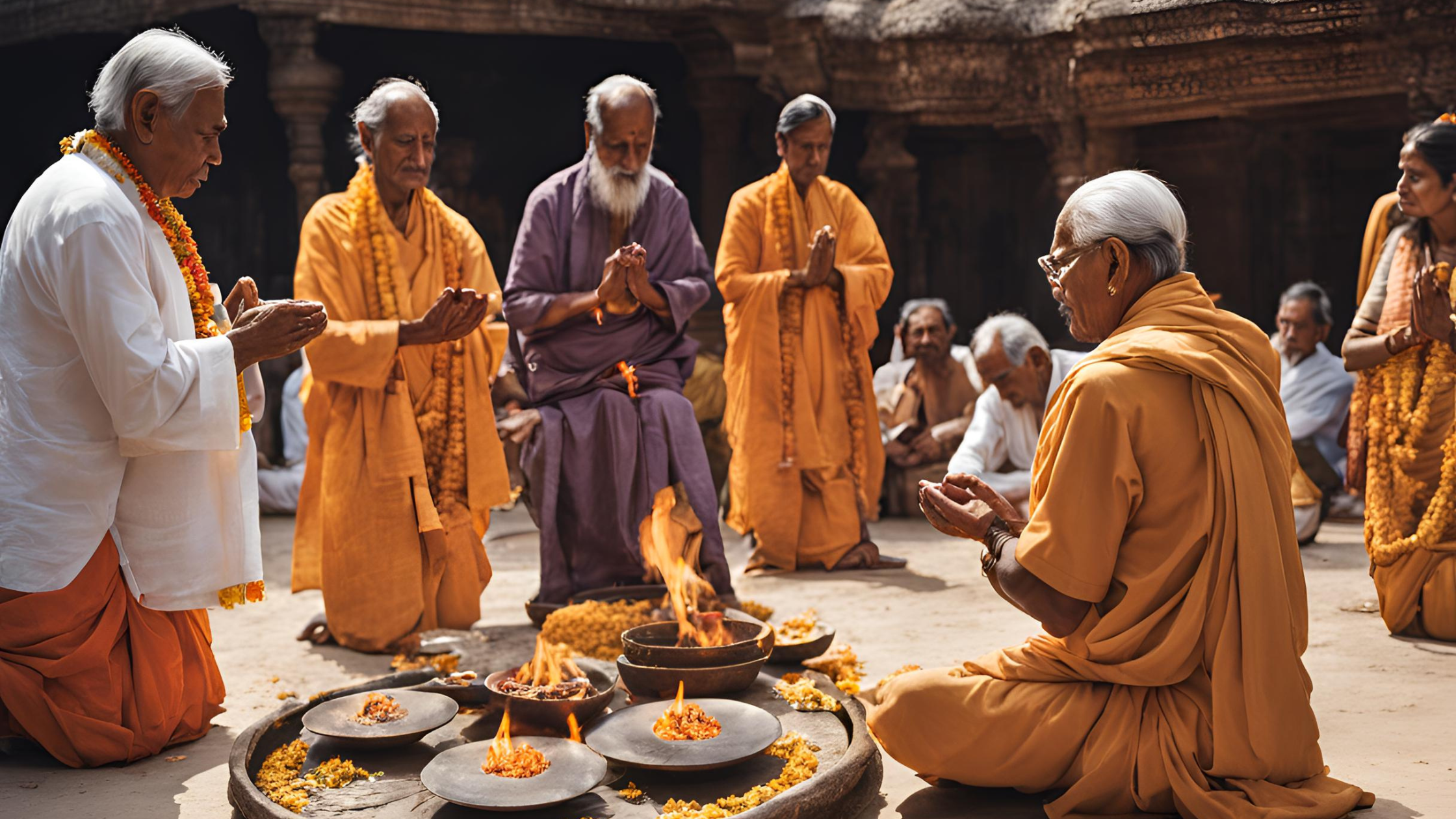What is Pitralok?
Pitralok, in Hindu tradition, refers to the realm of ancestors. It is believed that this sacred space is where the souls of departed ancestors reside. The concept of Pitralok underscores the importance of honoring and remembering those who have passed away. During specific times of the year, particularly during the Pitru Paksha period, Hindus perform rituals to acknowledge their ancestors and seek their blessings.
Pitralok is considered a place of spiritual significance, where the souls of ancestors live and are remembered by their descendants. The rituals performed during Pitru Paksha aim to ensure that these souls are at peace and that their blessings continue to guide and protect their living family members.
What are the Rituals in Hinduism?
Hinduism rituals are integral practices encompassing various ceremonies and acts of devotion. These rituals can range from daily prayers to elaborate ceremonies performed during specific times of the year. They serve multiple purposes, including honoring deities, seeking blessings, and maintaining spiritual connections with ancestors.
One of the key rituals in Hinduism is the Pitru Puja, performed during the Pitru Paksha period. This ritual involves offering food and prayers to ancestors, ensuring their peace and well-being. The ceremonies typically include offerings of rice, sesame seeds, and water, which are believed to nourish the souls of the departed. Additionally, various chants and mantras are recited to invoke blessings and express gratitude.
Hindu rituals also include ceremonies for major life events, such as births, marriages, and deaths. Each of these rituals plays a crucial role in maintaining the balance between the physical and spiritual realms. They help individuals connect with their spiritual heritage and uphold the values and traditions of their ancestors.
Why Rituals are Important?
Rituals hold significant importance in Hinduism for several reasons:
- Rituals for Peace: Performing rituals, especially during the Pitru Paksha period, is believed to bring peace to the souls of ancestors. By honoring the departed, individuals ensure that their ancestors find rest and satisfaction in the afterlife.
- Spiritual Connection: Rituals help maintain a spiritual connection between the living and their ancestors. They serve as a bridge, allowing descendants to show respect and seek blessings from their forebears.
- Gratitude Expression: Engaging in rituals is a way to express gratitude for the contributions and sacrifices made by ancestors. It acknowledges their role in shaping the present and future of their descendants.
- Resolution of Karma: Many Hindu rituals are believed to help resolve ancestral karma. By performing these ceremonies, individuals seek to alleviate any difficulties or negative influences that may have been inherited from their ancestors.
- Family Unity: Rituals often involve the participation of family members, reinforcing family bonds and fostering a sense of collective responsibility. They help maintain unity and cohesion within the family, emphasizing shared values and traditions.
Overall, rituals play a vital role in Hinduism by connecting individuals with their spiritual heritage, ensuring the well-being of ancestors, and promoting family unity.
Ancient Story of Bhagirath
The ancient story of Bhagirath is a profound example of devotion and determination in Hindu mythology. Bhagirath was a legendary Ikshvaku dynasty king known for his unwavering dedication to bringing the sacred River Ganga to Earth.
According to the legend, Bhagirath’s ancestors were cursed by Sage Kapila and were denied entry to heaven. The only way to grant them salvation was to bring the River Ganga to Earth, as she was believed to have the power to bestow nirvana upon them. Determined to fulfill this task, Bhagirath undertook years of intense penance and meditation.
His unwavering devotion eventually pleased the gods, and they agreed to bring the River Ganga to Earth. However, the river’s powerful flow posed a challenge, as it could destroy the Earth. To channel the river’s flow safely, Lord Shiva agreed to hold the Ganga in his matted hair, allowing it to descend gently onto the Earth.
Bhagirath’s perseverance and devotion were rewarded when the River Ganga finally flowed to Earth. The river’s arrival brought immense blessings, and Bhagirath’s ancestors were granted salvation. This story highlights the significance of devotion, determination, and the power of sacred rituals in Hindu tradition.
Disclaimer: This blog includes information curated from multiple sources for reading purposes. This is not medical advice and we do not take any responsibility for any actions you take based on the uploaded information here.
Psychic Medium Daksh’s Contact Details:
Phone Number: +91-9511119918
Whatsapp Number: +91-9511119918
Official Email: contact@psychicmediumdaksh.com
Address: Psychic Medium Daksh, 414, Guru Harkishan Nagar, Delhi, 110087

